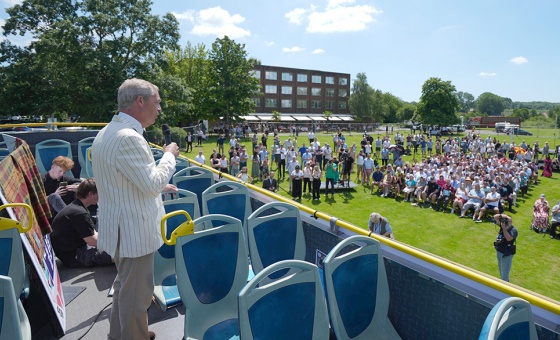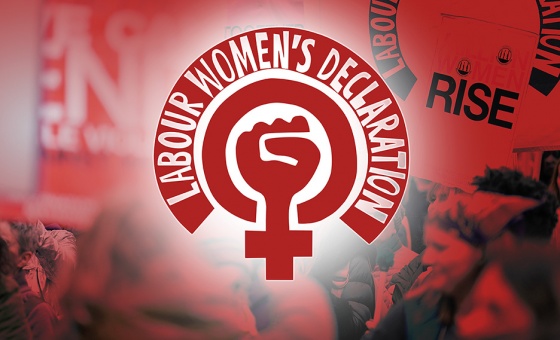This is the last article you can read this month
You can read more article this month
You can read more articles this month
Sorry your limit is up for this month
Reset on:
Please help support the Morning Star by subscribing here
“I’M A working-class lad and I want to look after the working-class people of Doncaster.”
This is how Tosh MacDonald sums up, in a single sentence, why he is standing as candidate for the Workers Party for the Doncaster Central constituency in South Yorkshire in the general election on July 4.
But, in McDonald’s mind, “looking after the working-class people of Doncaster” can mean anything from sorting out problems with local cycle-only lanes to getting Britain out of Nato.
The former national president of train drivers’ union Aslef has been retired since 2018 from both his train driving and his trade union activities, but his political work has, if anything, intensified.
At most major political events in Yorkshire and at many beyond, if he’s not on the platform as one of the speakers he’s in the crowd anyway along with his wife Nikki who shares his political beliefs.
McDonald, who is 63, was born in Doncaster and had a tougher childhood than most working-class kids.
“When I was three my mother and my sister left, never to be seen again, and when I was 11 I found my dad dead on the sofa. He’d had a brain haemorrhage,” he said.
He was brought up by his grandparents, both born in 1907, who moved down to Yorkshire from Scotland via Durham as they followed work in the coalfields.
“My grandfather gave me my politics,” he said. “They’d lived through the General Strike, the second world war.”
After leaving school he trained briefly in engineering but his vocation was on the railways, working first as a freight guard then as a train driver. He loved it, though for his last three years in the industry his presidency of his union Aslef meant he seldom saw the inside of a driver’s cab.
As a young man he’d been a member of the Communist Party of Great Britain “for quite a while,” but joined the Labour Party after canvassing for Labour locally.
On leaving the railways six years ago he and Nikki became Labour councillors in Doncaster.
He witnessed at both local and national level the rot that set in when the Labour Party turned on its last leader Jeremy Corbyn.
What happened to Corbyn was repeated — and is still being repeated — at local level with deselections of council candidates and imposition of shortlists of potential parliamentary candidates by the leadership.
“I was a Labour Party member for about 20 years,” said McDonald. “There were many Labour leaders who were not my choice but I never worked against them. Jeremy Corbyn was my choice and they worked against him from the moment he was elected.
“Eventually with the way Starmer was treating Corbyn, people being suspended, expelled, fellow councillors being deselected — five Doncaster Labour councillors were deselected, were told they could not stand for re-election, all five were industrial workers — I got more and more frustrated with Labour and left,” he said.
He stayed on as an independent Doncaster councillor as did Nikki, who also resigned the Labour whip.
“Then I got a call from the Sunday Times asking me what I felt about being suspended from the Labour Party,” he said. “It was the first I’d heard of it.”
During his time of growing disillusionment, he’d become a close friend of Chris Williamson, the former Labour MP for Derby North who was kicked out of the party ostensibly for his response to allegations it harboured anti-semitism, though more likely because of his campaigning to democratise candidate selections.
Williamson is now deputy leader of the Workers Party.
“I spoke at Workers Party fringe meetings at the TUC,” said McDonald. “I spoke at a national event they had in Birmingham.”
With the shock announcement of the July 4 general election he decided he wanted to stand as Workers Party candidate for Doncaster Central. He was welcomed.
The common assumption is that, with its industrial background, particularly steel and coal, Doncaster has always been solidly Labour. Not so, says McDonald. The Doncaster Central seat is seen as a marginal, fought between Labour and Tory.
“Not getting personal, but Doncaster Central has only had two Labour MPs, Sir Harold Walker and Dame Rosie Winterton. That says it all. Both became deputy speakers, meaning they could not vote or speak in debates, so Doncaster Central was not represented in Parliament.”
McDonald believes in the Workers Party’s 10-point programme on which it is standing candidates in more than 160 constituencies, including Rochdale where George Galloway became an MP after a by-election victory in February in which Labour withdrew its support for its own candidate over comments he made on Palestine.
The 10 points cover health, housing, education, welfare, warfare, employment, transport.
The party’s manifesto includes withdrawal from Nato which McDonald says is integral to the issue of immigration.
“Instead of being knee-jerk about immigration, it looks at the alliances we have which are stopping other nations from developing,” said McDonald.
“It’s not about stopping the boats. It’s about their own countries, about the West having fair trade deals with their countries — and stopping bombing them.”
He said the Workers Party’s stance on Nato meant “rather than fighting wars all around the world” Britain would work in co-operation with other countries.
“This resonates with me,” he said.
Another issue which resonates is its environmental policy. He believes that working people are bearing an unfair share of the costs of moving towards zero emissions — such as delivery drivers who can’t afford to switch to electric vehicles.
That may seem to be one small issue within the far greater challenge of Britain and worldwide green transition, but it places the welfare of the working class at the centre of McDonald’s political analysis.
He says that on the streets the campaign is “going really well.”
“I just walked back from town,” he said. “The campaign has got legs and it’s really running.
“Most importantly I’ve had a small donation from the bakers’ union [BFAWU], meaning I can use their logo. They pulled out of the Labour Party and they’re supporting me. I’m very proud of that.”
Labour’s candidate in Doncaster Central is Sally Jameson, a prison officer who is former agent to Dame Rosie Winterton.
 Peter Lazenby
Peter Lazenby









